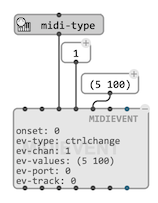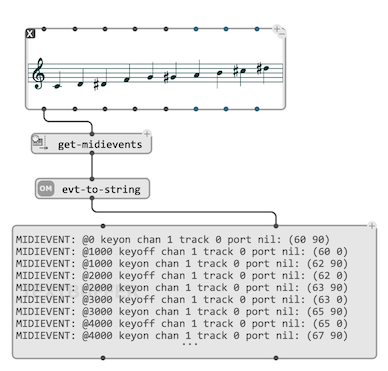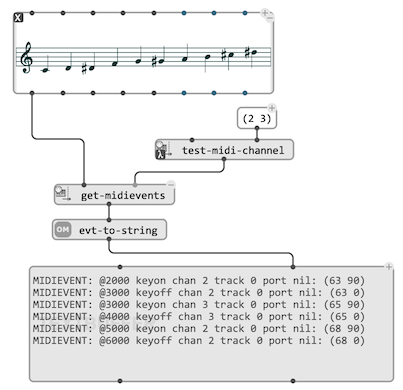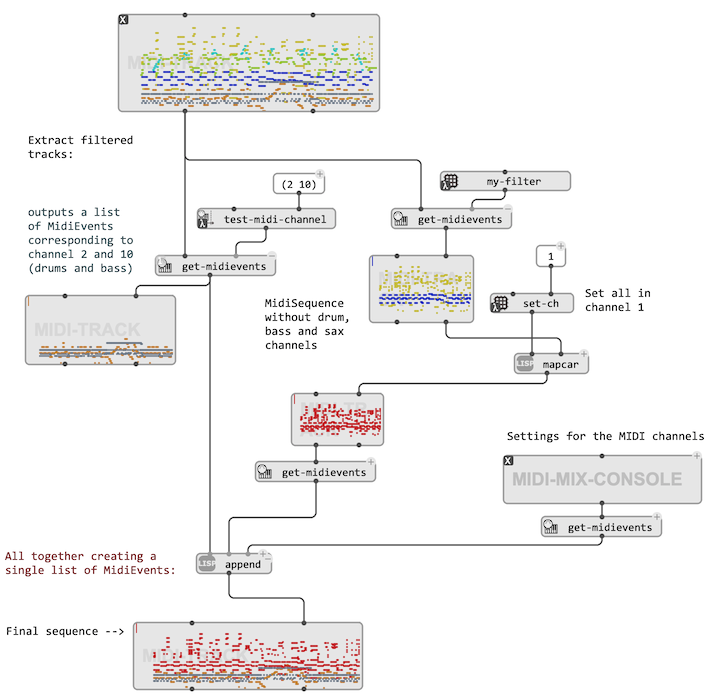OM# Documentation
MIDI Events
It is possible to ignore most of the underlying MIDI infrastructure and concepts when using score objects in OM#; however, some tools and data structures presented here allow working with it to process or render other musical structures.
The class MIDIEVENT
The class MIDIEVENT represents a simple MIDI message. It can be parameterized and sent out to a MIDI port, or processed and grouped along with other events to consitute musical sequences, typically in a DATA-TRACK, a MIDI-TRACK container, or in a Sequencer.

MIDIEVENT slots correspond to the basic attributes of a MIDI message:
:ev-typethe type of message (can be set wit themidi-typeutility):ev-chanthe channel of the message (1-16):ev-valuesa list of values, depending on the type of message.
Although not part of the MIDI message format, MIDIEVENT also includes two other parameters which help its manipulation and processing in the software:
:ev-portindicates a MIDI port number where this even should be sent.:ev-track(additional keywork input) indcates a MIDI track for this event.
In MIDI, notes are expressed by the succession of two events of types
KeyOnandKeyOff, which correspond to the activation and release of a given “key”. →MIDI-NOTEis a specialized class suitable to represent a note at higher, “musical” level, and adapted toMIDI-TRACKcontainers.
Extracting and processing MIDIEVENTs
get-midievents is a generic functions allowing to extract a list of MIDIEVENT from a MIDI-TRACK, or any compatible musical object:

Note: We use
evt-to-stringto control the list ofMIDIEVENTas text in aTEXTBUFFER.
The optional input :test allows connecting a test (a filter function or a patch in lambda mode) in order to filter the list returned by get-midievents. The filter function must have one single free input, correponding to an input MIDIEVENT.

Available filters include test-midi-channel, test-midi-type, test-midi-track, test-date, etc. (see MIDI package).
MIDIEVENTs can be recomposed into a new list and provided as input to MIDI-TRACK and/or saved to a file to compose a new consolidated sequence.
The Help patches in the MIDI section provide advanced examples of MIDI event extraction and filtering.
Extracting additional MIDI info
A few other utilities in the MIDI package allow extracting or converting sepcific kinds of MIDI info:
mf-inforeturns the MIDI notes info as processed and sorted lists of pitch, velocity, duration for each MIDI track.get-tempomapreturns lists with tempo changes.convert-textinfoconverts theev-valuesfield ofMIDIEVENTobjects of different textual types from ASCII code to readable text.get-mf-lyricsreturn the contents of messages of type:lyricsconvcerted as text- …
